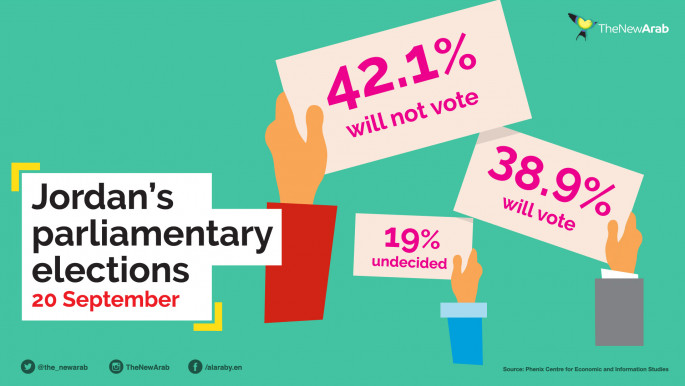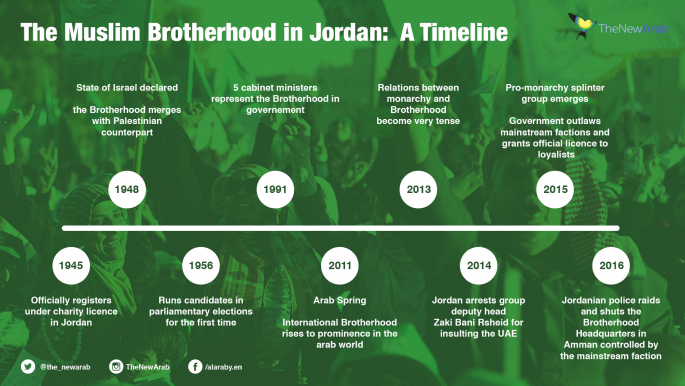Independents vs parties: Polls to test Jordan's electoral reforms
The system of voting for Jordan's parliament has been hugely controversial in the past. While some hope the new electoral bill kindles potential for party-based politics, critics argue the reforms are mere window-dressing to enable the new 2016 parliament to resemble those of the past that proved no real-check on the power of the king.
Tuesday's elections however will be the first since 1986 to be held essentially under a form of proportional representation, moving away from the former one-man one-vote system.
Jordan's previous parliaments have been well-known for the overwhelming dominance of "independents".
In 2007, 104 out of 110 seats were won by independent candidates.
"Independents" usually have no distinct political platform or ideological base. Many are voted because of their tribal backgrounds, their influence at the royal court or over what they promise to offer their local communities.
The power the "tribal vote" is known to be quite influential in Jordan. Tribal links more than any political agenda, are often seen as major factors in the election of an independent, particularly in the country's east.
 |
|
Opponents often claimed that older voting methods were setup by Jordan's monarchy to promote "independents" and stop the rise of political parties.
Disputes over voting systems were the central reasons for the boycott of the 2013 elections by the Muslim-brotherhood linked Islamic Action Front [IAF].
Jordan has over the past had a large array of parties, which aside from the main Islamist parties included far-left Marxist to Arab nationalists and Ba'athists parties.
But the often dizzying list of different party names betrayed a multitude of organisations that at best had a few hundred members.
 |
Opponents often claimed that older voting methods were setup by Jordan's monarchy to promote independents and stop the rise of political parties |  |
Rules imposed by the government in 2007 concerning party-formation also led critics to accuse the monarchy of seeking to halt the emergence of party-based politics.
But it is also the Jordanian public who seem unswayed by the parties themselves.
Aside from the main Islamist groups, other parties remain either unknown, distrusted or seen as unable to act in government. Yet, Tuesday's elections may offer new potentials.
The main Islamist groups are not boycotting the election, and "centrist" parties also have been campaigning to increase their share of the vote.
Of the main contestants, eyes will particularly fall on:
The 'Wasat' party
Seen as a centrist but Islamically-orientated party, the Muslim Centre Party [Hizb al-Wasad al-Islami] is the largest Islamic party distinctly independent from the Muslim brotherhood or it's off-shoots.
Winning seats in municipal councils over the past few years since its formation in 2001, the Wasat casts itself as the most moderate of the Islamicaly-orientated parties, calling for increased democratisation and gestures for a greater role for women in politics.
After the IAF/Brotherhood boycott in 2013, the Wasat won 16 seats becoming the largest single party [out of a total of 150, however].
 |
The Wasat casts itself as the most moderate of the Islamicaly-orientated parties, calling for increased democratisation and gestures for a greater role for women in politics |  |
The Muslim Brotherhood parties
The recent splits in Jordan's Muslim Brotherhood have been one of the most discussed aspects of Jordanian politics.
On Tuesday both the "main" party and its off-shoots are standing in the election.
One of the more consequential aspects of the election concerns concern the results between the main-party and it's off-shoots.
Most prominent of these is the IAF, the political wing of the main Jordanian Muslim Brotherhood organisation, who participates in Tuesday's elections at the head of the National Coalition for Reform [Islah].
While in 2007, the IAF's numbers in parliament dropped to six from a height of 17, it boycotted the 2013 election in protest at the voting system.
Now, as an attested majorly organised force, it has made the issue of "reform" its main electoral pledge.
At the same time however, the Muslim Brotherhood Society, one of the off-shoots that emerged following the split, has posted its own lists of candidates for Tuesday's elections.
Similarly the "Zamzam reformists" who also split from the IAF have now listed their own candidate as the "National Congress Party". Yet all-together, the parties have made political reform and democracy central to their campaign.
The IAF's listing of women and Christians further shows its distinct turn to "pluralism" as a central message of it's campaign.
 |
|
The secular and 'progressive' lists
At the same time, the genesis of new lists which sees commonly-identifying candidates group together under a common title, could potentially herald the rise of new parties over the coming years.
Groups like Taqaddam [Progress] are engaging as "guides" in the election process though without fielding distinct lists or candidates. Others however, including Ma'an [Together], have fielded their own lists of candidates.
Calling for "citizenship, justice, security", they state their core messages as including calls for separating religion for government and secularism in the political sphere.
As it stands, the answers as to whether the new parliament will be the "same old story" or a "dawn of a new age" will only be seen in the weeks and months following Tuesday's votes.





 Follow the Middle East's top stories in English at The New Arab on Google News
Follow the Middle East's top stories in English at The New Arab on Google News


